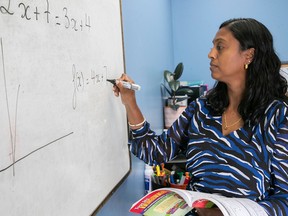How to ace your high-school admittance interview
“It’s not just about the academics. It’s probably not even the most important thing we find in a student,” says a Montreal school administrator.

content of the article
Application deadlines for many enriched academic high school programs for the 2023-24 school year are fast approaching. It is a time of anxiety for parents and children. But we want you to sit down and take a deep breath because we have some important information for you: Less preparation is better.
advertising 2
content of the article
“What we’ve seen is they know what they know,” says Theresa Gilmour, director of admissions at Loyola High School, a private institution.
content of the article
She and colleague Annie Beland, assistant principal for academics (primary) and coeducation, say their concern is with the whole child and preparing them for success.
“It’s not just about the academics,” says Beland. “That’s probably not even the most important thing we find in a student. Our first goal is to determine if the child can handle the workload. Report cards say a lot, and what we have learned during COVID (when exams and interviews have been suspended in many schools) is that reports often tell us enough.
“What you find is that when you look at the report card, the strongest student is going to be the strongest. The weakest will be the weakest. It’s the guys in the middle who are solidly average – if you give them an entrance exam that’s the same for everyone, you see the ones that have potential, or you might get problems you might not see on a transcript. ”
advertising 3
content of the article
Sharujan Thalayasingam felt the pressure while preparing to sit an admissions exam for college programs three years ago. He had heard that it would be difficult and that the selection rate was low. In the end, he found that the preparation itself was more difficult than the actual exam.
“I started the exam and it was so stressful at the beginning,” he says. But over time he found that it wasn’t all that different from other exams. He was admitted to three schools and is in the excellence program in the 10th grade at the École secondaire des Sources.
Thalayasingam was prepared at Académie Eureka, one of dozens of tutoring and support services in the Montreal area. Eureka Director Priya Selvarasa suggests that students preparing for the entrance exam have an average of at least 75 percent because “it’s a good starting point to meet the challenges of more demanding schools.” Most college programs require an average of 85 percent.
advertising 4
content of the article
They also look at behavior and personality, Selvarasa says. Are you open to others? Not afraid to do something new? Open to the world? It’s important to be confident, to talk about your personality and to know yourself.
“Learning is not just an academic subject,” says Selvarasa. “Your path to learning and growth could be in the arts, music and dance. You can’t forget your hobbies, your passions.”
Because of this, Beland and Gilmour believe the interview is the most important part of the process. Loyola receives 200 to 300 applications a year and every student is interviewed.
It can feel stressful for a child because it’s one on one with an adult they don’t know. But the intention is to get to know her. “I promise you I won’t ask you a question you don’t know the answer to,” says Beland. She tells them if she does, she’ll give them a candy bar. “I just want to get to know her a little better as a learner. What are the books you like to read? What are the things that make your heart sing?
advertising 5
content of the article
“Sometimes the pressure comes from within, sometimes from the peer group, sometimes from the parents. But we tell them that we are only there to listen to them. As the interview progresses, the child shows us who it is.”
Please don’t coach your kids, they say.
“Prepare them to greet someone, look them in the eye, shake their hand,” says Gilmour. Prepare them to dress nicely and brush their hair like they will do for a job interview in the future. “But don’t try to predict what the questions are and give the kids canned answers. If we don’t ask the question like this, the child is doomed because “my mother didn’t tell me how to answer that.” We can tell in a minute if it’s an 11 year old answering us. If it sounds like it’s coming from a 30-year-old, we know it. It’s not fair to the child.”
advertising 6
content of the article
Beland chats with the student as they walk into the interview room to help them relax. As a teacher, she knows how to encourage children and that it helps them to consistently encourage them when they are feeling uncomfortable.
The transition from elementary school to high school is enormous. It’s okay to go to another school or program for a year and reapply later if they’re not willing to face the workload: “That’s okay, they’re 11, there are those children,” says Beland.
“I knew a little boy who worked and worked and worked until he was in 9th grade,” says Gilmour.
When a child is not accepted, emotions can run high. Gilmour gives the parents time to think and then makes himself available to talk about it. Sometimes she overlooks something, she says, and after talking to the parents, they might look at the file. It’s natural for parents to get angry and maybe say, “You said you care about the whole person.”
advertising 7
content of the article
“Taking care of the whole person, especially on the academic front, means we take care of them by telling them it’s not the right place for the child so that at the end of the year we don’t give it to them as a student have to say can’t come back. It’s heartbreaking, but we’re doing it because we care.”
Last-minute academic preparation can help reduce stress levels for some children, perhaps if they feel their peers have an advantage because of their extra tutoring.
“I’m not saying do it or don’t do it — it has to be a personal choice of a family,” says Gilmour. She knew a student whose classmates were being primed, and he felt they were getting an edge he didn’t have.
Thalayasingam has no regrets about the time he spent preparing for his entrance exam, but he has some final advice for children preparing for exams in mid-September: “Don’t stress. It’s not as bad as people might say.”
advertising 8
content of the article

The whole kid
Vraj Limbachiya is a 4th grade student. It’s too early for him to consider applying to college programs, and he’s doing great at school anyway.
Instead of preparing for exams, he gives art classes at the Académie Eureka.
“It helps him with other activities” and with building confidence in subjects like math and French, says his father, Kamlesh.
Vraj learns art techniques and how to use his imagination to try new things.
Those are qualities college programs look for, Beland says. “There is no such thing as a model student. We are looking for students who are open to growth in every way. Are you willing to ask for a little more help, explore your faith at school, try a new sport or activity you’ve never tried before? Trying new things and finding the gifts and talents they might not have known they had.”
Sign up for our awesome parent newsletter at montrealgazette.com/newsletters.
-

It’s time for your child to ride public transport on their own. Here’s how to prepare
-

Nawaz: Year-round school? The academic year is not specified
